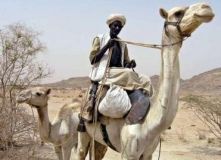Darfur JEM rebels emerge as key to east Sudan peace
June 8, 2006 (KASSALA) — Rebel group from arid eastern Sudan is due finally to start peace talks with Khartoum next week but the exclusion of Darfur-based Islamic rebels may bring yet more misery to the long-neglected region.
 The Eastern Front, comprising rebels from the region’s largest ethnic group — the Beja — and Rashidiya Arabs, are taking part in the negotiations in the Eritrean capital on Tuesday 13 June.
The Eastern Front, comprising rebels from the region’s largest ethnic group — the Beja — and Rashidiya Arabs, are taking part in the negotiations in the Eritrean capital on Tuesday 13 June.
But the meeting’s outcome may be decided by the increasingly effective Justice and Equality Movement (JEM), a moderate Islamist rebel group hitherto mainly active in the western region of Darfur, where it rejected a peace deal signed by the larger Sudan Liberation Movement last month.
The Eastern Front controls a slice of territory on the Sudanese-Eritrean border around the town of Hamesh Koreb and has been involved in low-intensity guerrilla activity against the Khartoum government for years.
While the Eastern Front has similar aims to its counterparts in Darfur — autonomy and greater control over their region’s resources — their newfound allies in the JEM demand a seat on the presidency, key to eventual national power.
The latest attack, on a government convoy on May 2, is believed to have been carried out by the JEM alone.
Suliman Baldo of Brussels-based think-tank, the International Crisis Group, said that such attacks showed the JEM could thwart the peace process in the east if its demands were not satisfied.
“The attack on May 2 shows the potential for spoiler action in eastern Sudan, that there could be an even greater conflict because the government is not going to invite the JEM to negotiations in Asmara,” he said.
“They may be inclined to do more operations like this.”
A Western security contractor familiar with the situation said the JEM fighters in the area were also showing unprecedented expertise.
“They don’t attack humanitarian convoys but the last two attacks were something new, they used the weather and the terrain.
“They know that when there’s a sandstorm the helicopter gunships can’t fly, so the next time there’s a sandstorm, they will hit.”
Kassala State governor Ibrahim Mahmoud Hamid said that the JEM had no place in peace talks for the east, which he predicted could be concluded swiftly if only the Eastern Front took part.
“I think when we start peace talking for the east, it will be very easy because the things now are very clear and the foundation has been readied,” he said.
“If the JEM people come, it’s not their place, they are far from the east. They are different people so they will not have a lot to do in the east without the Beja.”
Baldo said it was clear Khartoum wanted the talks to be held as far from the international spotlight as possible to avoid the sort of Western involvement that characterised the negotiations with Darfur rebels in Abuja.
“Khartoum wants a quick start and a quick conclusion so they can take place without much international attention,” he said.
“They want to be able to twist the rebels’ arm and reach a deal that is to their advantage.”
The rebels are not oblivious to the government’s tactics and are desperate for outside involvement in the talks.
“We need the international media to see our problems and to see the negotiations in Asmara. We want the UN and the US to be there,” Beja Congress spokesman Abdullah Mussa said.
“We didn’t see any change in the situation from the government, there are still so many problems, with security, with the state government,” he said.
Another cloud hanging over the talks is the promised withdrawal from rebel-held territory of the well armed fighters of the southern-based Sudan People’s Liberation Movement.
The eastern rebels formed an alliance with the SPLM after taking up arms against Khartoum in 1996, but under a peace deal it signed with Khartoum early last year the southern group is due to withdraw its forces, sparking fears that government troops might try to take advantage.
The United Nations Mission in Sudan (UNMIS) said it would be powerless to intervene in such an event, saying its mandate is restricted to monitoring the withdrawal of SPLM forces.
A recent ICG report criticised the UN’s lack of action.
“The UN has done less than anticipated both politically and on the humanitarian side, its actions marked by a visible lack of strategy, unsatisfactory internal planning, overall inconsistency and what is seen as a patronizing attitude towards the Eastern Front,” it said.
An UNMIS spokeswoman in Khartoum was unable to say whether the world body would be sending anyone to the Asmara talks. She also had no word on the state of preparations for the promised SPLM withdrawal from the east.
But Baldo said the SPLM was likely to stall its withdrawal at least until the talks were concluded. “I don’t think they’re in a hurry to leave. This is a very critical moment,” he said.
(ST)
